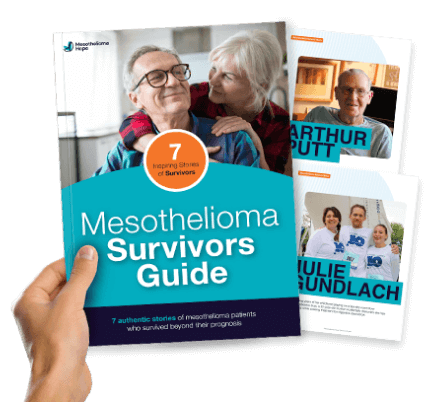Caring for Someone With Mesothelioma
Caring for a loved one with mesothelioma — be it your spouse, parent, friend, or relative — may feel like a full-time job.

People diagnosed with mesothelioma not only need expert medical care, but they may also need help coordinating appointments, traveling to and from their cancer treatment center, and even doing daily chores like tidying up or shopping for groceries.
If you are a mesothelioma caregiver, it’s normal to feel overwhelmed, exhausted, and sad — especially without help from others.
For this reason, it’s important to seek support from loved ones, friends and community members, support groups, and other organizations. This ensures both your loved one and you are receiving the best care possible.
“[It was] very tough on my family. Very hard on my kids. Hard on all of us. It changes your life. Cancer changes everybody’s life.”
Download our Free Self-Care for Caregivers Guide today for practical tips and advice to help you manage the challenges of caregiving while prioritizing your own well-being.
Tips for Mesothelioma Caregivers
If you are new to caregiving, or if you’re feeling burnt out, the following tips can help you manage your stress — and your loved one’s health — more effectively.
Prepare for Caregiving
After your loved one has a confirmed mesothelioma diagnosis, ask their doctor about what your role will be as a caregiver. A mesothelioma doctor can give you a better idea of how to prepare and how you can help.
Additionally, becoming educated on your loved one’s condition can help you know what to expect as you serve in this caregiving role.
You can learn about mesothelioma from:
- American Cancer Society
- American Lung Association
- Mayo Clinic
- National Cancer Institute
- National Organization for Rare Disorders
A study published in the June 2022 edition of the European Journal of Cancer Care followed 14 people who had provided care to mesothelioma patients. Among the findings, the researchers found that the caregivers’ lack of information about the disease and uncertainty about a patient’s prognosis caused them stress.
“Patients with mesothelioma and lung cancer, and their caregivers, are known to have some of the highest unmet needs of all cancer populations.”
The researchers said providing accurate information about prognosis, disease process, and access to care could help meet some of those needs.
Join a Mesothelioma Support Group
Mesothelioma support groups bring you together with other mesothelioma patients and caregivers. These groups also provide a safe place where you can speak honestly about your emotions and challenges.
Mesothelioma caregiver support groups meet:
- In-person
- Online
- Over the phone
In-person groups can be found by talking to the patient’s oncologist (cancer doctor) or medical social workers. Online groups are available on social media sites like Facebook.
Practice Self-Care
The importance of self-care cannot be stressed enough as you support a cancer patient. By caring for yourself, you can recharge and, in turn, provide more effective help to your loved one.
Mesothelioma caregivers can practice self-care by:
- Exercising regularly
- Finding time to relax
- Following a regular schedule
- Maintaining a social life
- Working to understand your feelings
You can also reach out to a mental health professional who can help you understand your emotions and cope with the experience.
“Your own health and safety must come first if you want to keep helping your loved one.”
One review of nearly 700 articles found that relaxation and anxiety-reducing techniques can be helpful for those caring for terminally ill people. The researchers also noted that caregivers’ quality of life can be boosted by family involvement, gaining knowledge about the disease and its treatments, and maintaining an optimistic attitude.
The study was published in May 2022 by the medical journal Palliative Care Review.
Learn how treatment and support from loved ones helped 7 mesothelioma patients become survivors in your Free Mesothelioma Survivors Guide.
Ask for Help From Others
The American Cancer Society encourages mesothelioma caregivers to work with friends, family, and even professionals to see if they can get help with their caregiving duties. There is no shame in getting help.
For example, you can ask a trusted relative or friend to pick up groceries or do other household tasks while you take your loved one to a doctor’s appointment. You can also look into getting an in-home nurse or aide if you can’t provide full-time care.
Mesothelioma Caregiver Roles


A great way for a mesothelioma caregiver to get support is to split up responsibilities with others. This strategy allows the patient to get the help they need while preventing one person from doing all the work.
Below, learn about different responsibilities loved ones may take on when caring for someone with mesothelioma.
Spouses
Spouses often take on the role of primary caregiver, leading the mesothelioma patient’s care and recruiting others to help. In many cases, they help research mesothelioma treatment options, including clinical trials.
Spouses of mesothelioma patients may need to:
- Ask family and friends when and how they may be able to help
- Hold regular family meetings and provide updates on the patient’s condition, needs, and care
- Make a list or calendar to keep shared responsibilities organized
If other family members can’t provide mesothelioma help, spouses can turn to friends, church members, or neighbors.
Children
Adult children are often a big part of a cancer support team, particularly if the mesothelioma patient and their spouse are elderly.
Children can provide support by:
- Driving their parent to medical appointments and taking detailed notes
- Helping with chores around the house and yard
- Hiring outside nursing help for in-home care
- Visiting regularly
If the mesothelioma patient is not married or their spouse cannot provide care, grown children may take on the role of primary caregiver.
Siblings
Close siblings can offer emotional support to those fighting mesothelioma. For example, siblings may be able to recount fond childhood memories that no one else would know. This can be a great comfort to patients.
Siblings can also serve as caregivers if the patient’s spouse and children are unable to do so, or if they simply need a break.
Parents
While mesothelioma mainly affects those over the age of 70, younger mesothelioma patients may be able to rely on their parents for care. If the patient is married, parents can support the spouse’s caregiving duties. In other cases, a parent may even serve as a primary caregiver.
Other Relatives and Friends
Mesothelioma patients often have friends or other relatives who are willing to help with care. For veterans with mesothelioma, this may include the men and women who served with the patient in the past.
At times, friends and relatives may not be sure how they can help. They can start by staying in regular communication with a patient and their mesothelioma caregivers.
Learn about the role that other caregivers played in their loved one’s battle against mesothelioma — get your Free Mesothelioma Survivors Guide now.
Resources for Mesothelioma Caregivers
As you provide care for someone with mesothelioma, remember that there are tools available to make the process easier. There are resources to help cover travel expenses, medical bills, and other costs.
Mesothelioma care resources include:
- Free or low-cost travel to treatment
- Lodging for overnight stays far from home
- Compensation through legal claims and asbestos trust funds
- Benefits and medical care from the U.S. Department of Veterans Affairs (VA)
Mesothelioma Hope offers 24/7 support for families dealing with mesothelioma.
Request your Free Mesothelioma Survivors Guide and see how other families dealt with a mesothelioma diagnosis and helped their loved one beat the odds.
Mesothelioma Caregivers FAQs
How do you care for someone with mesothelioma?
People who care for mesothelioma patients often perform a variety of duties that vary depending on the patient’s needs.
Your loved one may need more involved care if they are in a later stage of mesothelioma.
Common mesothelioma caregiver duties include:
- Bathing and dressing the patient
- Cooking food and helping the patient eat
- Coordinating treatment plans
- Driving the patient to and from doctors’ appointments
- Giving medications
- Hiring home health aids or other help
- Locating the best cancer center or health care facility for your loved one
- Managing Medicare, Medicaid, and other health insurance
- Navigating end-of-life care, including hospice care
What should I expect when caring for a mesothelioma patient?
You should expect your caregiving role to change over time.
At first, you may find yourself providing moral support until mesothelioma treatment starts. After treatment, you might need to help your loved one through the recovery process and manage any lingering symptoms and side effects.
You can also expect to feel both rewarded and challenged. Caring for someone with mesothelioma can be incredibly taxing, but it can also strengthen your bond.
What are some signs of mesothelioma caregiver stress?
People show signs of stress in different ways, and caregivers are no different.
Here are some common signs of caregiver stress:
- Chronic exhaustion
- Difficulty sleeping
- Disconnecting from others
- Frequent or recurring illnesses
- Irritability and forgetfulness
- Loss of interest in hobbies
It’s important to note these signs early on and take action by taking a break or getting professional help. Stress and burnout can take a toll on your health and the quality of care that you are providing.






